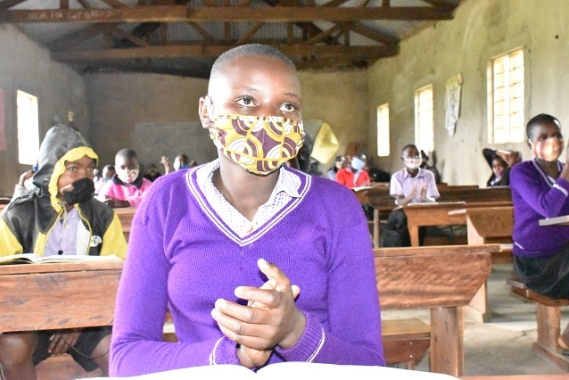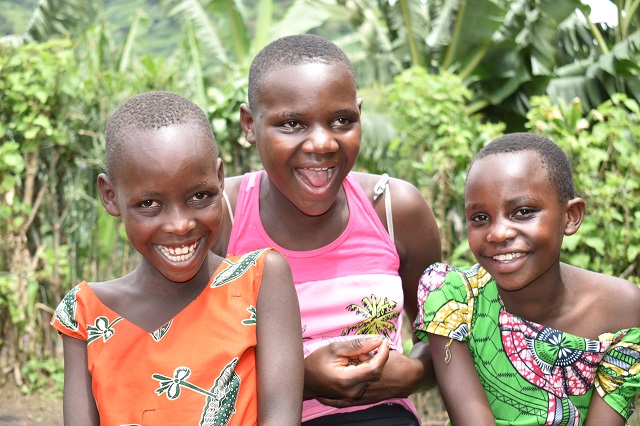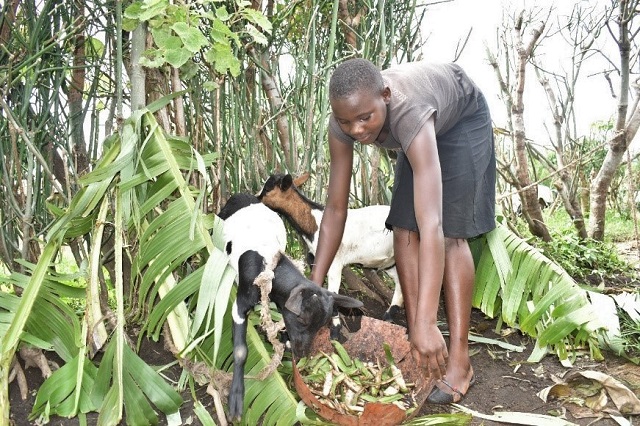Preventing Child Marriage in Uganda

Achen*, 14, would be married by now had her mother not spoken up against her relatives demands, and kept her daughter in school.
Relatives on Achen’s paternal side wanted her married at 10 years old, as a precondition for supporting her poor family soon after her father died in 2013. But her mother, Gorret, refused to budge, even though she did not know how to support her five children without a stable income.
“There is no way I was going to allow them to take my daughter’s education and future away from her. We have a culture that hurts children,” she says.
Achen says her friends who got married young are suffering from abuse and poverty. “My mother told me that I have to set a good example for my younger sisters because they will follow in my footsteps,” says Achen. “She has told me the best time to get married is after I complete college and get a job.”
Achen’s family lives in a village in Fort Portal in western Uganda, a melting pot of different cultures. The dominant belief is that girls are a resource to the family; they are more valuable when married young between 10 and 13 years old, because they can fetch upto 12 goats for their bride price.

But Gorret does not want an early marriage for her daughter. Gorret married young due to the lack of support from her parents and she has refused to let history repeat itself. Though she struggled to meet her children’s needs from the little income she earned from crushing stones at the quarry, Gorret stood by her word. The children often stayed home for a long time due to a lack of school fees and this worried Achen. She says the longer she skipped class, the more she feared staying out of school, permanently.
“I would cry so much whenever I was chased away from school,” Achen recalls. “My mother took weeks to raise part of my fees; during this time I would support her by taking care of my younger sisters and playing with them, doing house chores like cooking, and doing laundry,” she says.
SOS Children’s Villages’ Support
In 2019, Achen’s family received education and livelihood support from SOS Children’s Villages through its family strengthening program. Gorret joined a Village Savings and Loans Association (VSLA), and she attended other capacity-building training on topics like parenting and entrepreneurship. She stopped working at the quarry and started farming – planting passion fruits and onions. Achen and her siblings got the school supplies they needed to attend school uninterrupted.
Bbosa Abdul Hakim, the family strengthening coordinator working with Achen’s family says that girls in the region are disadvantaged on so many levels.
“The few schools available lack hygiene facitilities to support girls at school, especially during their menstrual cycle,” he says. “Students and teachers use the same toilets. The schools lack female teachers who can support the girls,” he says. The COVID-19 pandemic has added to the girls’ education crisis, and now some may never return to school due to early marriage, child labour or teen pregnancy.
SOS Children’s Villages continues to advocate for educating both girls and boys in the community; Hakim says this year the team has managed to stop four girls from entering early marriages. Four other girls were married off but were later found and integrated back with their families. They were counselled and then enrolled into a vocational school.
From her agribusiness, Gorret can now contribute up to 50% of the school fees required to educate her children. Reducing the cost of education for girls from poor families helps to keep them in school. This is a big relief to Achen since she no longer has to worry about skipping class because of poverty or discrimination. She recently returned to school after seven months at home due to the threat of COVID-19.

With the support from SOS Children’s Villages, Achen says she will study hard, pass her exams, complete school, find work and be a contributing member to her family and community. She is in Grade 7, her last class of primary school. Achen is a bright student with high hopes that she will be among the best in the region in the final national primary school exam.
“My dream is to be a nurse,” says Achen. “I saw my father die a miserable death after being bitten by a dog, and not receiving medication and support in time. When I become a nurse, my family will no longer suffer looking for health services, and my community will greatly benefit. My desire is for my education and skills to help everyone here in Fort Portal. I will inspire other young girls never to give up on themselves, and to know that education is the key to a better future.”
*Name changed to protect the privacy of the child.
Canadians wishing to help vulnerable children are encouraged to Sponsor a Child, Sponsor a Village or make a Donation today to our COVID-19 response.
